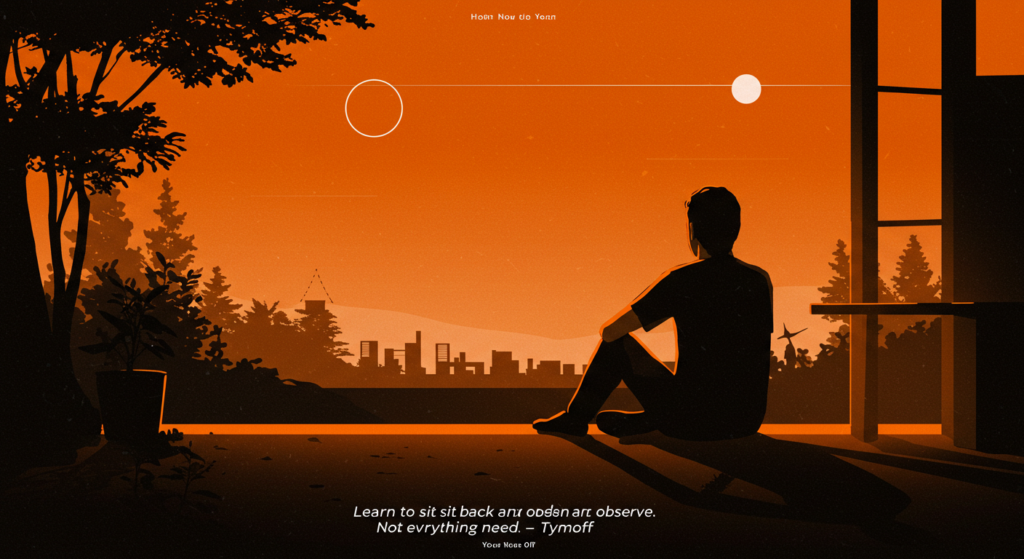In today’s fast-paced world, the art of observation often takes a backseat to reaction. The quote “Learn to sit back and observe. Not everything needs your attention,” popularized by Tymoff, encapsulates a profound truth about modern life. It encourages mindfulness, self-awareness, and the importance of discerning where to channel your energy. This philosophy, when adopted, can bring peace, clarity, and efficiency to your life. Let’s explore how embracing this approach can transform your perspective and interactions.
Understanding the Essence of Observation
Observation is more than merely seeing; it’s about truly understanding your surroundings and the dynamics at play. This skill allows you to:
- Gain Insight: By taking a step back, you’re able to comprehend situations more clearly, identifying patterns and underlying issues.
- Avoid Impulsive Reactions: Observing before acting reduces the chances of hasty decisions driven by emotion rather than logic.
- Build Empathy: Understanding the motivations and emotions of others becomes easier when you’re not consumed by the urge to react.
The Science Behind Sitting Back
Mindfulness, a practice closely aligned with observation, has been extensively studied. Research shows that mindfulness can:
- Reduce Stress: Observing your thoughts without judgment lowers cortisol levels.
- Enhance Focus: Mindfulness improves cognitive function, enabling better decision-making.
- Improve Emotional Regulation: Learning to observe your emotions allows you to manage them effectively.
Practical Ways to Embrace Observation
- Practice Active Listening: Pay attention to what others are saying without immediately formulating a response. This not only enhances communication but also builds stronger relationships.
- Engage in Mindful Practices: Meditation and deep breathing exercises teach you to focus on the present moment.
- Journal Your Thoughts: Writing down your observations helps clarify your thinking and provides insights into recurring patterns.
- Detach from Unnecessary Drama: Not everything requires your involvement. Evaluate whether your input is genuinely needed or if it’s better to let things unfold naturally.
- Set Boundaries: Protect your mental space by avoiding situations and people that drain your energy without adding value.
Benefits of Observing Rather Than Reacting
- Improved Relationships: By observing rather than reacting, you foster healthier interactions based on understanding rather than conflict.
- Enhanced Problem-Solving Skills: A calm and observant mind is better equipped to find solutions.
- Increased Productivity: Focusing your energy on what truly matters eliminates distractions, boosting efficiency.
- Greater Emotional Stability: Observing your emotions helps you respond with intention rather than reacting impulsively.
Applying Tymoff’s Wisdom in Daily Life
- In Personal Relationships:
- Avoid unnecessary arguments by observing the situation before responding.
- Practice patience and empathy to understand your loved ones better.
- In Professional Settings:
- Approach challenges with a problem-solving mindset rather than immediate reaction.
- Observe team dynamics to identify opportunities for collaboration and growth.
- In Social Media Consumption:
- Limit engagement with negative content. Not every online debate deserves your attention.
- In Personal Growth:
- Use observation as a tool for self-reflection, identifying areas for improvement without self-criticism.
Real-Life Examples of the Power of Observation
- Leaders and Visionaries:
- Many successful leaders attribute their achievements to the ability to observe and analyze before making decisions. For instance, Warren Buffet spends significant time reading and reflecting, highlighting the value of observation in strategic thinking.
- Artists and Creatives:
- Writers, painters, and musicians often draw inspiration from their surroundings. Their keen observation helps them capture emotions and ideas in their work.
- Nature Enthusiasts:
- Observing nature teaches patience and the interconnectedness of life. It’s a reminder that growth and change often happen quietly over time.
Overcoming the Challenges of Observation
- Resisting the Urge to React:
- It’s human nature to respond instantly, but with practice, you can train yourself to pause and assess.
- Dealing with FOMO (Fear of Missing Out):
- Understand that stepping back doesn’t mean missing out; it means choosing quality over quantity in your engagements.
- Balancing Observation with Action:
- While observation is crucial, knowing when to act is equally important. Strive for a balance that aligns with your goals.
Cultivating a Culture of Observation
Encouraging observation in your community can lead to collective growth. Here’s how you can promote this practice:
- Lead by Example: Demonstrate the benefits of observation in your actions.
- Foster Open Dialogue: Create spaces where people feel heard and valued.
- Celebrate Thoughtfulness: Acknowledge those who take the time to understand and contribute meaningfully.
The Long-Term Impact of Observation
Adopting Tymoff’s wisdom isn’t just about personal growth; it’s about creating a ripple effect of positivity and mindfulness in the world. When more people choose to observe rather than react, the collective consciousness shifts towards understanding, patience, and harmony.
Final Thoughts
“Learn to sit back and observe. Not everything needs your attention,” is more than a quote; it’s a call to action—or rather, inaction. It’s a reminder to focus on what truly matters, to conserve your energy for what deserves it, and to find peace in observation. By embracing this approach, you not only enrich your own life but also contribute to a more thoughtful and compassionate world.



